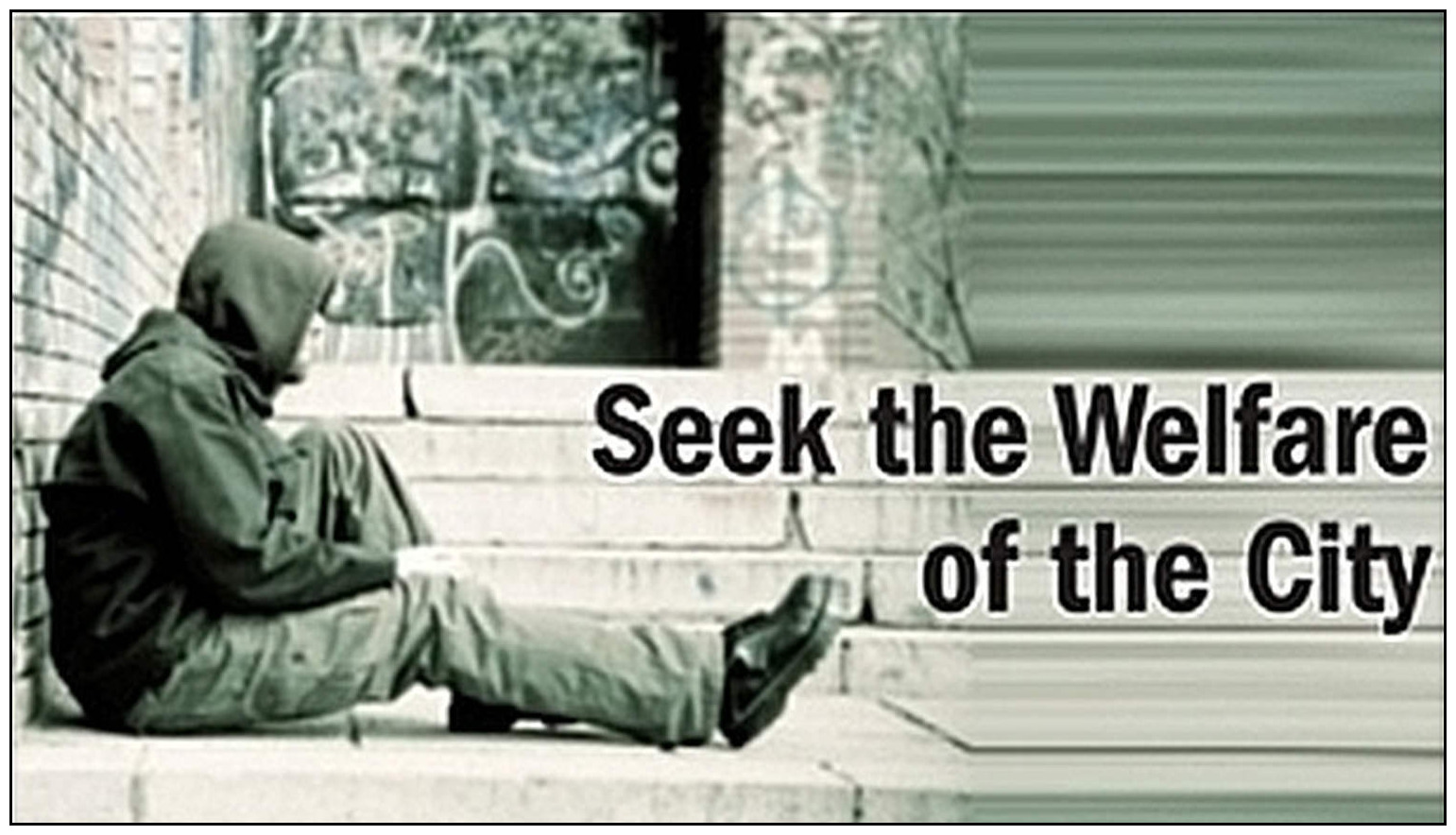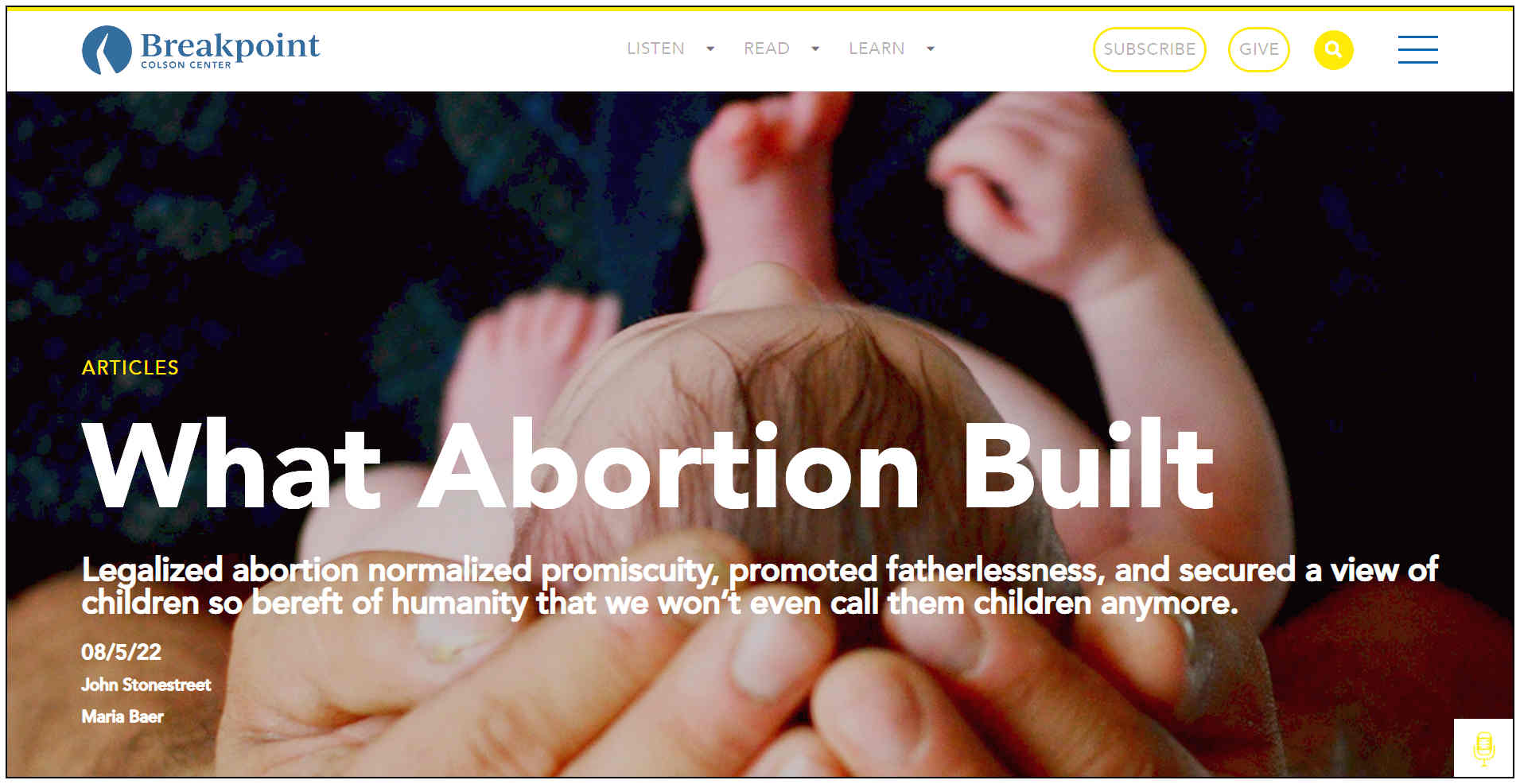WE NEED YOUR HELP! Perhaps you've read this before and are wondering, "Why am I seeing this again?" But millions of other Christians haven't seen it! So please use the "share" buttons above to share it with your social media friends. Thanks!!
SEEK THE WELFARE OF THE CITY, PART 2
 In case you're thinking "That was then, but this is now!" about Jeremiah 29:7 – "Seek the welfare of the city" – well, you're in for a surprise. It explains in Part 1 that there were beggars who refused to work, so Christian philanthropists were warned not to simply give them money: "Here we clearly see the goal of the social ministry of the Church: 'The role of social work is to make the recipient aware of the need to change' – unless the poor or disabled person makes a commitment to change, our efforts to help may be in vain." Human nature hasn't changed much in the past 2,000 years!
In case you're thinking "That was then, but this is now!" about Jeremiah 29:7 – "Seek the welfare of the city" – well, you're in for a surprise. It explains in Part 1 that there were beggars who refused to work, so Christian philanthropists were warned not to simply give them money: "Here we clearly see the goal of the social ministry of the Church: 'The role of social work is to make the recipient aware of the need to change' – unless the poor or disabled person makes a commitment to change, our efforts to help may be in vain." Human nature hasn't changed much in the past 2,000 years!
On our "Homes and Jobs" page, go to the link: "Get Your Life on Track." You'll see several Scriptures illustrating the lifestyle that Christians should have. At the bottom of that section is another link: "Do you want to be restored to wholeness?" which takes you to our Problem Assessment: Physical and Spiritual Rehabilitation Plan that we can fill out with our disabled or unemployed clients. Midway through the form, after gathering the client's work and health history, are the following words:
I want to be restored to wholeness, and therefore I am ready to change my lifestyle.
Signature: I, _________________, agree to follow the plan.
The client must be willing to change his/her mindset and lifestyle. Here is what the Apostle Paul wrote in 2 Thessalonians, chapter 3 about this:
"6 Now we command you, brothers, in the name of our Lord Jesus Christ, that you withdraw yourselves from every brother living in idleness, and not after the tradition which they received from us. 7 For you know how you ought to imitate us. For we were not idle among you, 8 neither did we eat bread from anyone's hand without paying for it, but in labor and travail worked night and day, that we might not burden any of you; 9 not because we don't have the right, but to make ourselves an example to you, that you should imitate us. 10 For even when we were with you, we commanded you this: 'If anyone is not willing to work, neither let him eat.' 11 For we hear of some who among you walk in idleness, who don't work at all, but are busybodies. 12 Now those who are that way, we command and exhort in the Lord Jesus Christ, that with quietness they work, and earn their own living. 13 But you, brothers, don't be weary in doing good. 14 If any man doesn't obey our word in this letter, note that man, that you have no fellowship with him, to the end that he may be ashamed. 15 Don't count him as an enemy, but admonish him as a brother."
What did the Early Church Fathers have to say about the above Scripture passage? –
"Paul strongly emphasizes, in strict words of command, the importance of labor, especially manual labor, as an accompaniment to prayer and fasting. These religious acts must never substitute for hard work (Chrysostom, Augustine). Prayer without work is a pious pretext (Cyril of Alexandria). There is no inconsistency between trusting God to provide and engaging in hard work in order to support ourselves and not be a burden on others (Augustine, Caesarius of Arles). Faithful and hardworking members of the congregation must be careful to make a sharp separation between themselves and those brothers and sisters who are living in a disorderly way (John Cassian, Theodore). Paul holds himself up as "the form of a believer," expecting the Thessalonians to see in him how one ought to live (Chrysostom, Pelagius). In our pursuit of faithful discipleship we are to avoid the controversy that arises from idle questioning and curiosity (Basil). Christian brothers and sisters who depart from the discipline and charity required by faith are to be directly confronted (John Cassian). There is the very real danger that if we consort with erring brothers and sisters, we will be infected with their wrongdoing (Cyprian)." (Ancient Christian Commentary on Scripture [digital version], IVPress)
In the ancient Greco-Roman Empire it was common for the poor to attach themselves to a wealthy patron who would feed them, sometimes in exchange for being mistreated and made the butt of jokes, at other times in exchange for serving their patron. But there were some poor who would simply flatter their patrons, going from one patron's luxuriously spread table to another patron's table. This latter case was so embedded in the culture that it became the subject of ancient comedies and training in rhetoric: such people were called "parasites." In the above Scripture passage, St Paul warns against such behavior that would bring the Christian community into ridicule. St. John Chrysostom was trained by a rhetorician who used such stories, and Chrysostom adopted it in some of his writings.
"In such a culture, the parasite effectively served to parody the lavish life – and especially the dinner habits – of the wealthy, people who could afford to have parasites at their tables as the evening entertainment. Chrysostom explicitly repudiates the mutual exploitation of the more affluent [who] pick out those persons whose laziness has made them victims of hunger, and maintain them as parasites and dogs feeding at the table: they stuff their shameless bellies with the leftovers of these iniquitous banquets and exploit their hosts at will." (Paul Blowers, "St. John Chrysostom on Social Parasites," http://academiccommons.columbia.edu/catalog/ac%3A138418, pp. 21-22)
As an aside, in today's culture wars the post-Christian and neo-pagan elements of our society often blame Christians for "hateful" attitudes toward the marginalized, especially LGBT people. In a Scripture passage similar to 2 Thes. ch. 3 above, St. Paul taught what the Christian viewpoint should be regarding these persons:
"7 Purge out the old yeast, that you may be a new lump, even as you are unleavened. For indeed Christ, our Passover, has been sacrificed in our place. 8 Therefore let us keep the feast, not with old yeast, neither with the yeast of malice and wickedness, but with the unleavened bread of sincerity and truth. 9 I wrote to you in my letter to have no fellowship with sexual sinners; 10 yet not at all meaning with the sexual sinners of this world, or with the covetous and extortioners, or with idolaters; for then you would have to leave the world. 11 But as it is, I wrote to you not to have fellowship with anyone who is called a brother who is a sexual sinner, or covetous, or an idolater, or a slanderer, or a drunkard, or an extortioner. Don't even eat with such a person. 12 For what have I to do with also judging those who are outside? Don't you judge those who are within?" (1 Cor. 5:7-12)
By mentioning "Christ, our Passover" and "let us keep the feast" it is clear that St. Paul is referring to fellowship at the communion table, the early Church's "agape feast." He also uses the Greek word "pornos" that is translated here as "sexual sinners" and in this context refers to incest. But the root meaning of "pornos" is a male prostitute, that is, a homosexual. The Apostle Paul teaches here that sexual sinners, the covetous, extortioners, drunkards or idolaters should not be allowed to partake of communion (see his similar teaching in 1 Cor. 10), but he does not teach that Christians should judge or shun those in "the world" outside the Church. If we were to avoid contact with all sinners in the world, we "would have to leave the world," he wrote. The Christian sub-culture should be radically different than the surrounding world; however, we should not judge those outside the Church, but rather demonstrate Christ's love for the tax collectors and harlots – sexual sinners.
Thus we see that the Church is to be governed by Christ-like agape-love, a pure and holy, unselfish love for God and neighbor. That's why agape was translated as "charity" in the King James Version. Charity or philanthropy (phileo + anthropos = "brotherly love for humankind") is showing care and concern for others who are worse off than ourselves, regardless of whether they "deserve" our care or not. This was the radically new aspect of social ministry that Christianity brought to the Greco-Roman Empire. Part and parcel of this was the role of women in the philanthropy of the Byzantine Empire. in Part 1 we learned of the deaconess Olympias, a follower of St. John Chrysostom who gave all her wealth and her life to serve the poor, orphans, elderly, sick, widows and outcasts. He had to warn her to be wise about her giving, so that it would be directed to those in immediate distress and not squandered on professional beggars. We also learned in Part 1 about the wife of Emperor Justinian, Empress Theodora, who was herself a converted prostitute, built hospitals for the sick and dying, and the "Metanoia" home for wayward girls.
"And yet Olympias was not the only one who carried out the command of Christ. St. Makrina, sister of Basil the Great, St. Synklitike, Nikarete, Melania, ...Theophano, Irene, Xeni of John Comnenus and many other auspicious and even known women of Greek Christian Byzantium practiced great philanthropy.
"I must, however, add two more words about the wellloved Athenais, the non-Christian Athenian woman who became a Christian in Constantinople. Athenais was baptized taking the name Eudokia, became the finest prototype of harmony of Greek education and the Christian faith and a select example of a woman who used education, social position, wealth and service for people especially for the sick, the hungry, the unclothed, the poor and the neglected. Among the many philanthropic institutions that Athenais-Eudokia established was a great poorhouse for 400 indigents. Constantinople, Antioch, and Jerusalem benefited from the philanthropic generosity of Athenais. Her example became an inspiration for other prominent queens and ladies of Christian Hellenism." (Demetrios Constantelos, "Women and Philanthropy in the History of Hellenism," http://intraweb.stockton.edu/eyos/arhu/content/docs/djc%20archive/Women%20and%20Philanthropy....pdf, p.4)
Another great resource on women's ministry in the church is Philanthropy and Social Compassion in the Eastern Orthodox Tradition edited by Matthew J. Pereira, 350 pages containing 22 articles devoted to philanthropy in the Orthodox Church past and present. There is simply not space or time here to delve into all of these articles. What happened to the role of women as deaconesses? Why did the philanthropy of the Byzantine Empire come to an end? Perhaps it was precisely because of the great works of charity begun by Olympas, Theodora, Eudokia and others which began as personal charitable work but were gradually taken over by the state. The earliest Christian teachings on this are from Christ Himself, from the Apostle Paul, and from the Apostolic Constitutions:
"15 Then the Pharisees went and took counsel how they might entrap him in his talk. 16 They sent their disciples to him, along with the Herodians, saying, 'Teacher, we know that you are honest, and teach the way of God in truth, no matter who you teach, for you aren't partial to anyone. 17 Tell us therefore, what do you think? Is it lawful to pay taxes to Caesar, or not?' 18 But Jesus perceived their wickedness, and said, 'Why do you test me, you hypocrites? 19 Show me the tax money.' They brought to him a denarius. 20 He asked them, 'Whose is this image and inscription?' 21 They said to him, 'Caesar's.' Then he said to them, 'Give therefore to Caesar the things that are Caesar's, and to God the things that are God's.' 22 When they heard it, they marveled, and left him, and went away." (Mat. 22:15-22)
The Early Church Father Severus wrote in his Cathedral Sermons, Homily 104: "Indeed, the act of giving tax to Caesar does not prevent the service of God, although you would like to think so. This is why it is necessary for you to give to God equally what is God’s, in such a manner that if what is Caesar’s is kept for the service of God, it is necessary that God be preferred to him. If you remain a tributary of Caesar, you should attribute this to your sins, not to God. In the same way, Paul similarly applies himself to the same distinction. In sending a letter to the Romans he wrote, 'Pay to the world, therefore, what is due to the world; to those you owe taxes, taxes; to those you owe tribute, tribute.'" (Ancient Christian Commentary on Scripture [digital version], IVPress) From this it's clear that we must not make an either-or choice; instead it is both-and: some spheres of human activity should be paid for with taxes collected by the state, and other spheres should be funded by giving to God. But how exactly can we delineate these two spheres? St. Paul gives us the answer:
"1 Let every soul be in subjection to the higher authorities, for there is no authority except from God, and those who exist are ordained by God. 2 Therefore he who resists the authority, withstands the ordinance of God; and those who withstand will receive to themselves judgment. 3 For rulers are not a terror to the good work, but to the evil. Do you desire to have no fear of the authority? Do that which is good, and you will have praise from the same, 4 for he is a servant of God to you for good. But if you do that which is evil, be afraid, for he doesn't bear the sword in vain; for he is a minister of God, an avenger for wrath to him who does evil. 5 Therefore you need to be in subjection, not only because of the wrath, but also for conscience' sake. 6 For this reason you also pay taxes, for they are ministers of God's service, attending continually on this very thing. 7 Give therefore to everyone what you owe: taxes to whom taxes are due; customs to whom customs; respect to whom respect; honor to whom honor. 8 Owe no one anything, except to love one another; for he who loves his neighbor has fulfilled the law. 9 For the commandments, 'You shall not commit adultery,' 'You shall not murder,' 'You shall not steal,' 'You shall not give false testimony,' 'You shall not covet,' and whatever other commandments there are, are all summed up in this saying, namely, 'You shall love your neighbor as yourself.' 10 Love doesn't harm a neighbor. Love therefore is the fulfillment of the law." (Rom. 13:1-10)
Here we see our obligation as Christians to pay taxes to earthly rulers because they "bear the sword" – they protect citizens from external enemies and internal criminals and evildoers (verses 1-7). These are the spheres of human activity that the state should provide for. But verses 8-10 describe the spheres of human activity which the Church should provide for: loving one another, teaching sexual morality, when it is wrong to take another human life, not to steal, lie or covet. These moral ideals must come from within: the state cannot force people to love their neighbors or the poor, sick or elderly – that often produces just the opposite of love – resentment. And how can the state prevent the inner desires of coveting, greed, jealousy, etc.? In fact, our consumer-oriented society promotes them!
The Apostles not only left us the New Testament, but also a collection of canons for governance of the Church called the "Constitutions of the Holy Apostles." St. John of Damascus, in his De Fide Orthodoxa: An Exact Exposition of the Orthodox Faith, Book 4, Chapter 17, actually considered that work compiled in the early second century by Clement of Rome, a disciple of the Apostles, to be included in the New Testament. Other scholars date it from the 3rd or 4th centuries. But its ancient manuscript had been lost and was only rediscovered and translated from the "Ethiopic" (Coptic) language in the 1800s. It is a rich source of information on Church order the first century, for example:
"Canon XX. Concerning him who has been ordained through bribery. If there is a bishop or an elder or a deacon who has taken the grade of priest by bribery, let him be deposed. And let him who ordained him also be deposed and removed forever from the priestly office and let them not associate with him in any respect, just as I [Peter] removed Simon the Magician from me.
"Canon XXI. Concerning him who calls in aid that he may hold [office in] the Christian church. If a bishop obtains a position through the assistance of the princes of this world and rules the Christian church through them, let him be removed and deposed, he and all who follow him." (biblicalstudies.org.uk/pdf/jbl/1885_061.pdf
It goes on to delineate between the bishop's stewardship of church property and his own property in Canons XXX and XXXXI, priests forbidden to eat or drink in a public inn except in dire necessity when travelling, forbidden to ridicule the deaf, lame, blind or deformed, the hierarchy of metropolitans, bishops, priests and deacons, and much more. From these we see a definite order of worship and life, including ministry to the poor, lame, maimed and blind. But also we see that some bishops had yielded to the temptation of greed for wealth and power, so rules were adopted that forbade such sins, and the penalty was removal from office.
After Emperor Constantine made Christianity the official state religion of the Greco-Roman Empire, bishops often received not only offerings from believers for the Church's ministry to the poor, sick, widows, orphans and elderly; but also large sums of money from the government for these social ministries. Eventually, bishops occupied administrative positions similar to judge, mayor or governor, with all the honors and benefits that go with such positions, and their robes even today are derived from those of Byzantine government officials.
The book A History of Simony in the Christian Church details too many sad stories of buying church office and other corruption in the first eight centuries of the Church. And the death of Charlemagne in 814 AD was the zenith of the Byzantine Empire, after which the rise of Islam and its attacks on the Christian Greco-Roman Empire greatly diminished the borders of Byzantium, which eventually shrunk down to the fortress walls of Constantinople itself before that city fell to the Muslims. The Byzantine state was so encumbered by its social welfare programs that it could not properly fulfill its primary function to "bear the sword" and defend the populace.
From all this we can fairly conclude that when the Church becomes just another department of the state and receives enormous amounts of tax money for social welfare, it becomes a cumbersome bureaucracy that is nearly as subject to waste, greed and graft as any modern secular government agency. We can draw the lesson that charity and philanthropy should begin and end at home, in the local parish where Christians should have first-hand acquaintance with the people seeking help, and are able to offer the right kind of assistance that will not create dependency, but rather restore them to spiritual as well as physical wholeness.
An excellent article on how best to offer help to the needy is Do Christians practice too much ‘toxic charity’? by Fr. Dwight Longenecker. It is a summary of the book Toxic Charity by Robert Lupton, which I highly recommend.
I encourage you to read online Seek the Welfare of the City – Part 1. (Also available to download in PDF format at https://agape-biblia.org/literatura/#welfare) And enroll in our free courses to see how YOU can do diakonia-ministry!
Click on the "Share" buttons above TO SHARE THIS ↑ ESSAY with your friends, and click on Contact to WRITE YOUR COMMENTS.
Also, enroll in our free courses to see how YOU can do diakonia-ministry:
Here's our next free online course: (click →) Course 100 - "Rehabilitation of Children with Disabilities" - deadline to enroll: 2 October 2022 (← click) So enroll today, before you forget!
Keep our websites free! Support Agape Restoration Society via PayPal: click the "DONATE" button.
Also, please Share Our Vision with your family & friends.
And bookmark our Amazon Smile link to shop at Amazon!

 (13 Sep.) Live Action President and Founder Lila Rose appeared on Dr. Phil on Monday to discuss life in America following the fall of Roe v. Wade. The episode covered multiple abortion-related topics but focused heavily on a couple from Louisiana that was recently refused an abortion for their baby who had been diagnosed with a life-threatening condition and was deemed likely to die at birth. Also appearing remotely was pro-life Louisiana Senator Katrina Jackson (D).
(13 Sep.) Live Action President and Founder Lila Rose appeared on Dr. Phil on Monday to discuss life in America following the fall of Roe v. Wade. The episode covered multiple abortion-related topics but focused heavily on a couple from Louisiana that was recently refused an abortion for their baby who had been diagnosed with a life-threatening condition and was deemed likely to die at birth. Also appearing remotely was pro-life Louisiana Senator Katrina Jackson (D). (13 Sep.) The award-winning Boston Globe Spotlight team of investigative reporters has targeted a New Hampshire cardiothoracic surgeon. In a series of articles, the Globe claims that Dr Yvon Baribeau had more settlements over surgical deaths than any other physician in the United States.
(13 Sep.) The award-winning Boston Globe Spotlight team of investigative reporters has targeted a New Hampshire cardiothoracic surgeon. In a series of articles, the Globe claims that Dr Yvon Baribeau had more settlements over surgical deaths than any other physician in the United States. (22 Sep.) Freedom of religion and belief is, along with other human rights, severely restricted within the Russian-occupied Ukrainian territory of Crimea. Forum 18's survey analysis documents violations including: forced imposition of Russian laws and restrictions on exercising human rights, including freedom of religion or belief; jailing Muslim and Jehovah's Witness Crimean prisoners of conscience; forcible closure of places of worship; and fining people for leading meetings for worship without Russian state permission.
All human rights including the freedom of religion and belief are severely restricted within the Russian-occupied Ukrainian territory of Crimea. Among the occupation forces' violations documented by Forum 18 are:
(22 Sep.) Freedom of religion and belief is, along with other human rights, severely restricted within the Russian-occupied Ukrainian territory of Crimea. Forum 18's survey analysis documents violations including: forced imposition of Russian laws and restrictions on exercising human rights, including freedom of religion or belief; jailing Muslim and Jehovah's Witness Crimean prisoners of conscience; forcible closure of places of worship; and fining people for leading meetings for worship without Russian state permission.
All human rights including the freedom of religion and belief are severely restricted within the Russian-occupied Ukrainian territory of Crimea. Among the occupation forces' violations documented by Forum 18 are: (21 Sep.) Mike Lee’s way of life has faded away in most of the United States, and it soon will vanish from southwestern Iowa. Lee, 57, has spent 44 years at the Glenwood Resource Center, a state-run institution for people with intellectual or developmental disabilities.
(21 Sep.) Mike Lee’s way of life has faded away in most of the United States, and it soon will vanish from southwestern Iowa. Lee, 57, has spent 44 years at the Glenwood Resource Center, a state-run institution for people with intellectual or developmental disabilities. (21 Sep.) From February 24 to September 20, 2022, at least 270 religious sites in 14 regions of Ukraine were fully or partly ruined by the aggressive attack of the Russian Federation: churches, mosques, synagogues, educational and administrative building of Ukraine’s religious communities.
(21 Sep.) From February 24 to September 20, 2022, at least 270 religious sites in 14 regions of Ukraine were fully or partly ruined by the aggressive attack of the Russian Federation: churches, mosques, synagogues, educational and administrative building of Ukraine’s religious communities. (5 Aug.) As America adjusts to the Supreme Court's decision overturning Roe v. Wade, including by enacting more laws in some states to protect unborn children, a higher number of women will likely bring their babies safely to birth. This is good news, including for those in unexpected and crisis pregnancies. Not only will more at-risk babies be saved, more women will be spared the violence and false promises of abortion.
(5 Aug.) As America adjusts to the Supreme Court's decision overturning Roe v. Wade, including by enacting more laws in some states to protect unborn children, a higher number of women will likely bring their babies safely to birth. This is good news, including for those in unexpected and crisis pregnancies. Not only will more at-risk babies be saved, more women will be spared the violence and false promises of abortion.
